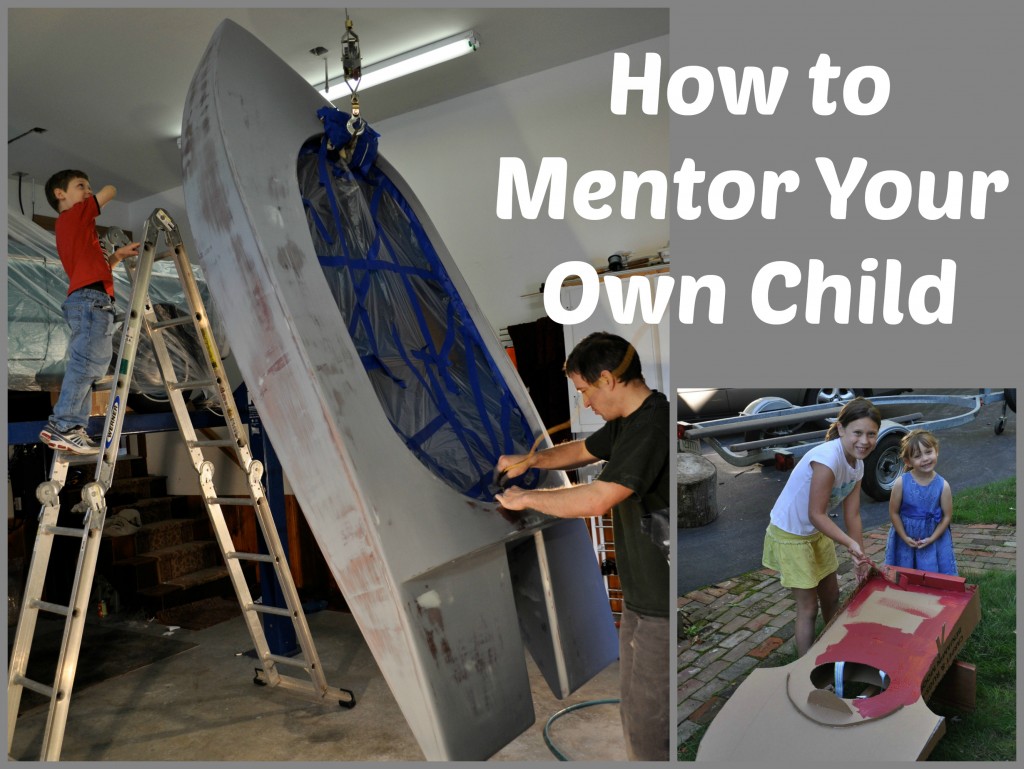I wrote last week about how watching adults at work provides children with wonderful learning opportunities. Unfortunately, despite my belief in mentorship, I have to admit that I tend to get in my own way in the implementation stage. Here are 7 strategies that have worked for our family to help me overcome my own reluctance:
- Take a deep breath – Allowing kids to watch you at work requires patience. They will slow you down with all of their questions and make a mess as they explore your space, but it is worth the sacrifice. Having children help with real work empowers them to learn independently. Education is most fun when it involves doing things that are challenging, messy, and time consuming. Expect interruptions, and remind yourself that the mess is a good thing.

- Provide opportunities for boredom – Sometimes in the interest of education we over-schedule our kids. Children need time to daydream and explore. It is important for them to discover boredom and figure out how to overcome that boredom on their own, and to get into difficult situations and figure out how to get out of it without running to an adult. They also need time to formulate their own questions and time to sit with you watching day-to-day activities. This time will allow them to choose what to do, and also what not to do, as they discover their own passions and preferences.

- Face your fears – Eventually a child who is watching you will ask to help. Children love being trusted to accomplish adult work, and it is important for us to allow them this opportunity. Exploring the adult world requires a bit of risk. They will probably cut themselves touching knives, and fall while climbing up a ladder. As crazy as it sounds, this is a good thing. Learning self-control, safety procedures, and the proper use of tools is important to start when the stakes are low. A job site is not the place to begin doing risky things for the first time.

-
Give encouragement, not answers – This is so much harder than it sounds. It is difficult to watch our children struggle. Especially when they voice that frustration in the form of annoying whines. I often have to remind myself that a solution that is discovered is so much more meaningful and easily retained than a parroted answer. In order to allow them this opportunity we need to step back. Remember your mom telling you to look up a word in the dictionary rather than simply spelling it aloud for you? That is the principle here. Have them do their own research, even when giving the answer is easier. That doesn’t mean that you can’t help. Often when a child is stuck for an answer it is because they don’t know which question to ask. Prodding them along with encouraging questions like “What do you think?” or “How could we?” encourages them to think critically and creatively, taking the initiative to direct their own learning. Eventually this process will allow them to develop the skills they need to ask new questions and find new answers on their own.

- Don’t hover – Standing over your child watching their every move puts them on the spot. It will limit their creativity because of the fear of being judged. Work beside them on your own project, show what you are doing occasionally, but don’t sit and watch your child at work. When your children do a task, they build their brain connections. When you hover over them narrating each step in order you reinforce your own brain connections without adding to theirs, and that isn’t the goal. If they come to you asking how to make a cake, simply hand them the cookbook and begin a different project at the other end of the counter. They will love knowing that you trust them to do the job, however awkwardly, on their own.

-
Allow failure – It is important that we allow children to fail in order to teach them that success comes from trying, not from avoiding risk. Unfortunately, this means that if your house is anything like mine you will have many baking-soda-rich cakes and nail-deficient forts to deal with in the process. My favorite phrase is “Whoops. Accidents happens.” It acknowledges the mistake without drama or passing judgement on the child. I love hearing my kids repeat it to each other when a sibling drops a plate or when they feel frustrated with their own limitations. Learning perseverance requires practice and a knowledge that they can keep working on their projects for as long it takes to reach success. Encourage your child that failure a natural part of life rather than a point of embarrassment.
One of my greatest joys is seeing the happiness on my kids’ faces when they accomplish their “grown-up” goals through their own hard work.
When your kids look around today what will they see you doing? Are you ready to have them jump in and join you? I hope so – it will help them to develop not only a passion for learning, but also self discipline, imagination, curiosoty, and valuable skills.



“Allow Failure” is my favorite. This is one of the things I try to live by with my own children. I could care less how many times they make mistakes as long as they learn from them. Some of life’s most important lessons are found that way!
I hear you. Getting As isn’t as important as learning.
These are all so great! I admit that I get in the way too when I try to mentor my kids. As moms, I think we just want to help too much sometimes. I use the “What do you think?” question a lot. My kids love to try and solve problems!
“What do you think” is a great phrase!